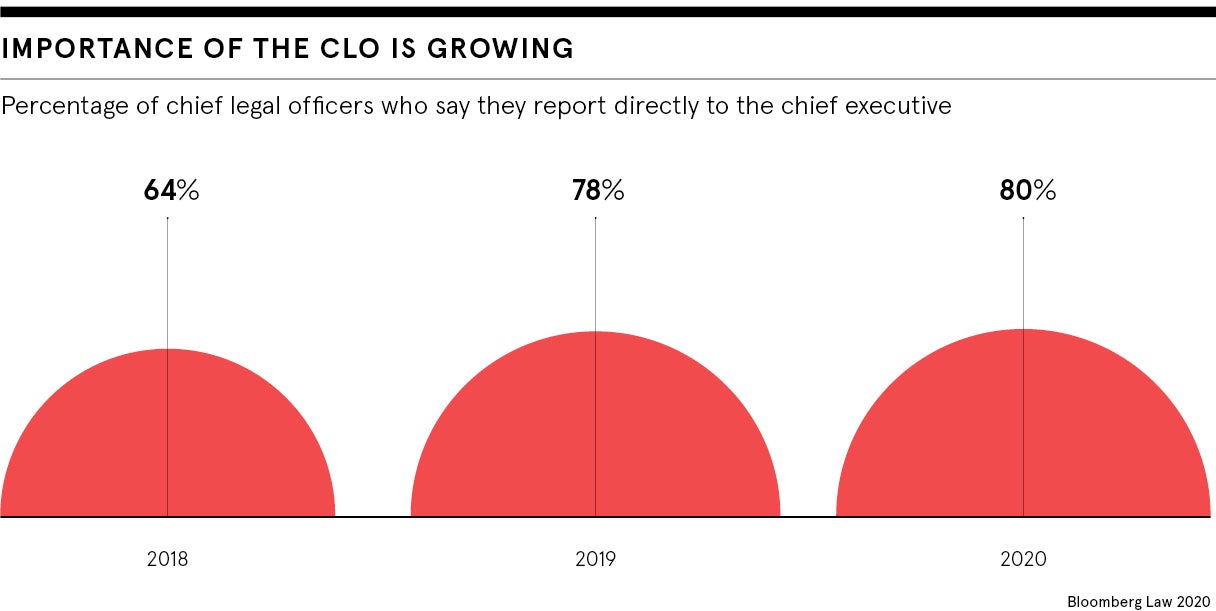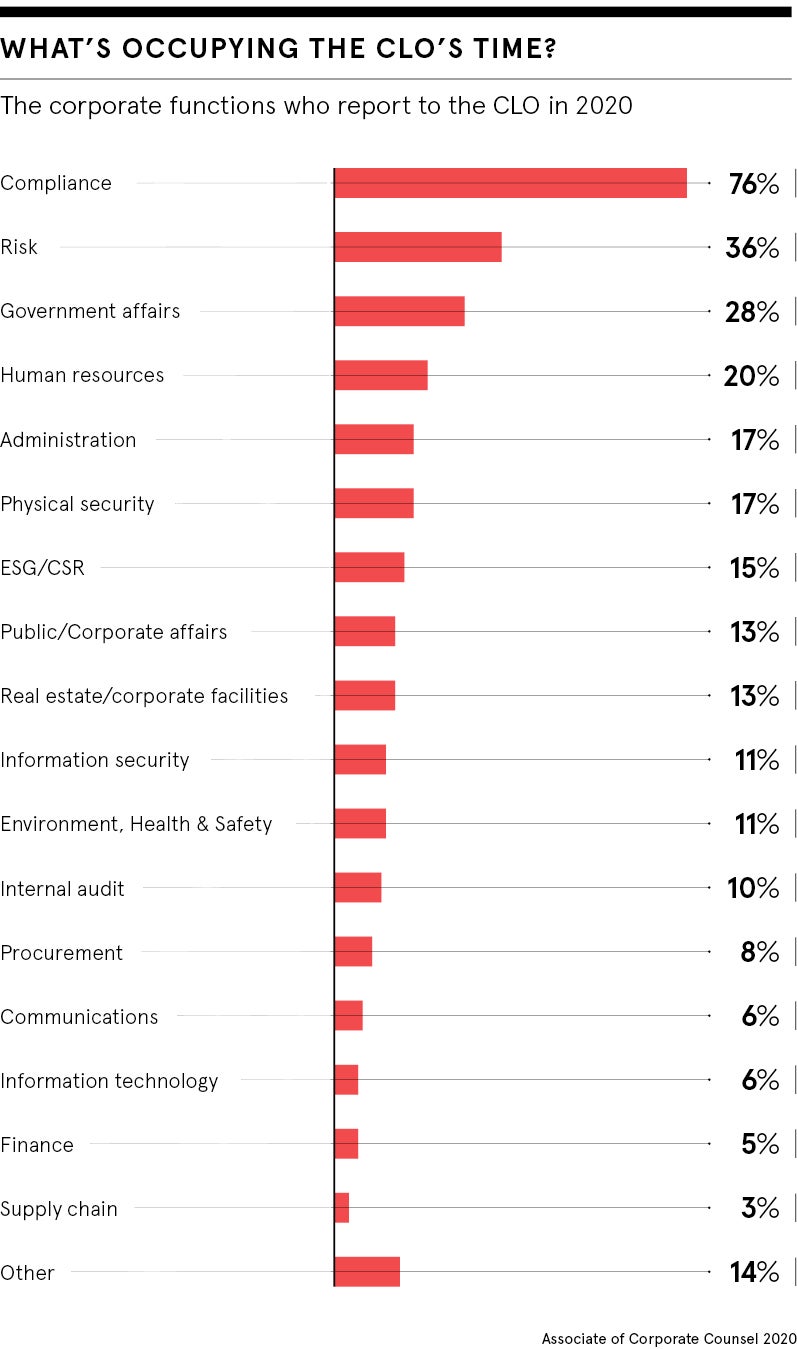
For the last two decades, their star has been rising. Once considered purely as professional advisers, in-house counsel are now viewed as valued business partners who help shape and deliver corporate strategies. As regulation has proliferated and the challenges to business intensified, legal input in the early stages of business development and legal oversight of operations has become evermore vital. The responsibilities of in-house counsel have grown accordingly.
Research by the Washington-based Association of Corporate Counsel (ACC) testifies to the continued strengthening of the position of the chief legal officer (CLO) or general counsel (GC). Its 2020 Chief Legal Officer Survey reveals that 80 per cent of CLOs now report to their chief executive while 76 per cent attend board meetings and 73 per cent are almost always engaged by their executive leadership team on business decisions. Given this trend, what is the world of the future in-house lawyer likely to look like?
The importance of recruitment and nurturing talent
Recruiting and nurturing talent will be crucial for GCs, while those aspiring to work in-house will have to develop and hone certain skillsets. Though legal capabilities are essential, commercial awareness and an ability to work collaboratively are just as crucial.
Adele Callaghan, senior business director of legal recruiters Hays Legal, says: “GCs are seeking commercially focused lawyers who are technically strong and solutions focused, who can quickly establish credibility with key stakeholders in the business, from the board and management team to more junior colleagues. In-house lawyers need to be approachable and succinct and able to quickly grasp the core issues in business situations.”
In-house lawyers need to be approachable, succinct and able to quickly grasp the core issues in business situations
Strong legal competencies are required by Rosemary Martin, GC and company secretary at Vodafone Group, who leads a global team of 460 people. Above all, however, her team members must possess empathy, enthusiasm, initiative, adaptability, and an ability to understand the business and help it progress.
“Your organisation’s geographical reach or operational focus can shift quickly and new areas of law and business must be understood and mastered rapidly,” she says. Working with business colleagues, she stresses, requires good social and influencing skills, and an ability to appreciate their business aims.
GCs may have to cast their net wider than ever to recruit those with the right skills. Helen Lentle, director of legal services for the Welsh Government, recruits nationally for her expanding department. “I recruit people from various sectors and backgrounds, and not necessarily people with public law experience. I want bright, committed people who can pick up things quickly and move across our 18 teams from health to planning,” she says. Her department has embraced remote working for some time and continuing it beyond the coronavirus pandemic will enable Lentle and others to recruit lawyers who are based in more diverse locations.

General counsel must be tech savvy
A considerable ongoing challenge for in-house lawyers will be the ability to embrace technology. “In-house lawyers need a good knowledge of technology and how it can affect not only how the legal department’s work is done, but how the organisation operates. This and artificial intelligence (AI) will be major aspects of the in-house lawyer’s life in future,” says Martin.
In-house counsel can also expect to be working alongside a greater range of other specialists in their departments, including legal operations executives, project managers and those with specialist technical skills. Martin’s own department now has a legal digital transformation manager.
But since legal departments have flatter structures, nurturing and motivating team members are key considerations for GCs. A range of training and work opportunities are used to enhance their competencies. Lentle’s in-house team can access a range of technical and soft-skills training both in-house and externally, and lawyers can volunteer for large projects. The Step Opportunities programme she has developed enables them to gain short-term experience in other areas of the civil service, including other jurisdictions. “All this is hugely important for maintaining interest and motivation,” says Lentle.
Catherine Johnson, group GC of London Stock Exchange Group, encourages her legal and compliance staff, and especially more junior lawyers, to work across teams that serve different business divisions. “We encourage secondments to business teams within the group and to different jurisdictions. We offer a range of training on legal and business skills, and do a lot of mentoring,” she says.
According to ACC research, GCs predict greater regulation, risk management, cybersecurity, data protection, piracy and greater financial scrutiny will be the matters occupying them most in the future. Added to this is the relatively new concern of social media, especially its impact on reputational risk. “Reputation management is a big part of what we do now and will be in the future,” says Martin. A range of tools will be harnessed to address such issues.

What the future holds for in-house lawyers
While external law firms still provide specialist advice and transactional support where needed, high-volume, routine work is now frequently outsourced to legal services providers, a trend likely to continue. Johnson has outsourced more standardised work to various organisations. “This makes the handling of this work cheaper and quicker, and allows my team to focus on value-added work,” she says. In the meantime, a weather eye must be kept on the offerings of new service providers, such as the new legal arms of the Big Four accounting firms.
The savvy use of technological processes can help GCs scrutinise and monitor their workflows, and prompt more creative solutions for work management. The newest tool available to aid in-house counsel is AI, which is likely to be a standard aid in future. “We’ve used AI effectively in large disclosure exercises and complex matters, which involve high levels of documentation like mergers and acquisitions,” says Johnson. “When people get used to it, the benefits will be significant.”
On the people management side, given that more organisations will be adopting more flexible working arrangements, a big issue will be the supervision of those who work remotely, especially more junior in-house counsel. Whatever the challenges in-house counsel confront therefore, they can be assured that their wellbeing will be of greater concern too.
New roles for in-house counsel

Many general counsels (GCs) now serve their organisations in additional capacities and more are likely to do so in future. For example, Rosemary Martin is company secretary of Vodafone Group, while at London Stock Exchange Group Catherine Johnson also manages compliance. Other functions for which GCs may be responsible are human resources, risk management, corporate social responsibility, internal audit and corporate communications. All complement the legal role and stand adjacent to it.
GCs may also sit on their organisation’s board of directors. This is less common in the UK, where it may sometimes be seen as impinging on their role as an objective adviser, though this may be less of a concern in other jurisdictions.
As evidenced by the Association of Corporate Counsel’s 2020 Chief Legal Officer Survey, it is increasingly common for GCs to be members of executive committees alongside members of the chief executive’s team and those from other key disciplines. Martin, Johnson and Helen Lentle, director of legal services for the Welsh Government, serve on the executive committees of their organisations, while Lentle also sits on the Welsh Government Board, which supports the permanent secretary. Such trends highlight the increased appreciation of the vital role the in-house lawyer can play in stewardship of their organisations.

For the last two decades, their star has been rising. Once considered purely as professional advisers, in-house counsel are now viewed as valued business partners who help shape and deliver corporate strategies. As regulation has proliferated and the challenges to business intensified, legal input in the early stages of business development and legal oversight of operations has become evermore vital. The responsibilities of in-house counsel have grown accordingly.
Research by the Washington-based Association of Corporate Counsel (ACC) testifies to the continued strengthening of the position of the chief legal officer (CLO) or general counsel (GC). Its 2020 Chief Legal Officer Survey reveals that 80 per cent of CLOs now report to their chief executive while 76 per cent attend board meetings and 73 per cent are almost always engaged by their executive leadership team on business decisions. Given this trend, what is the world of the future in-house lawyer likely to look like?
